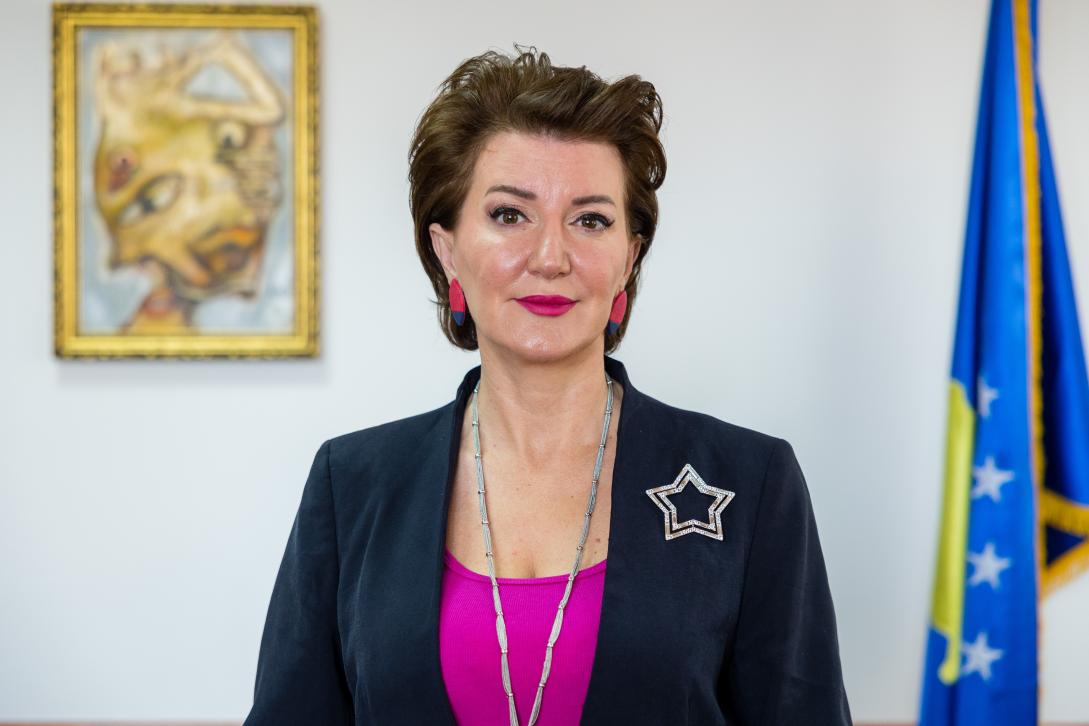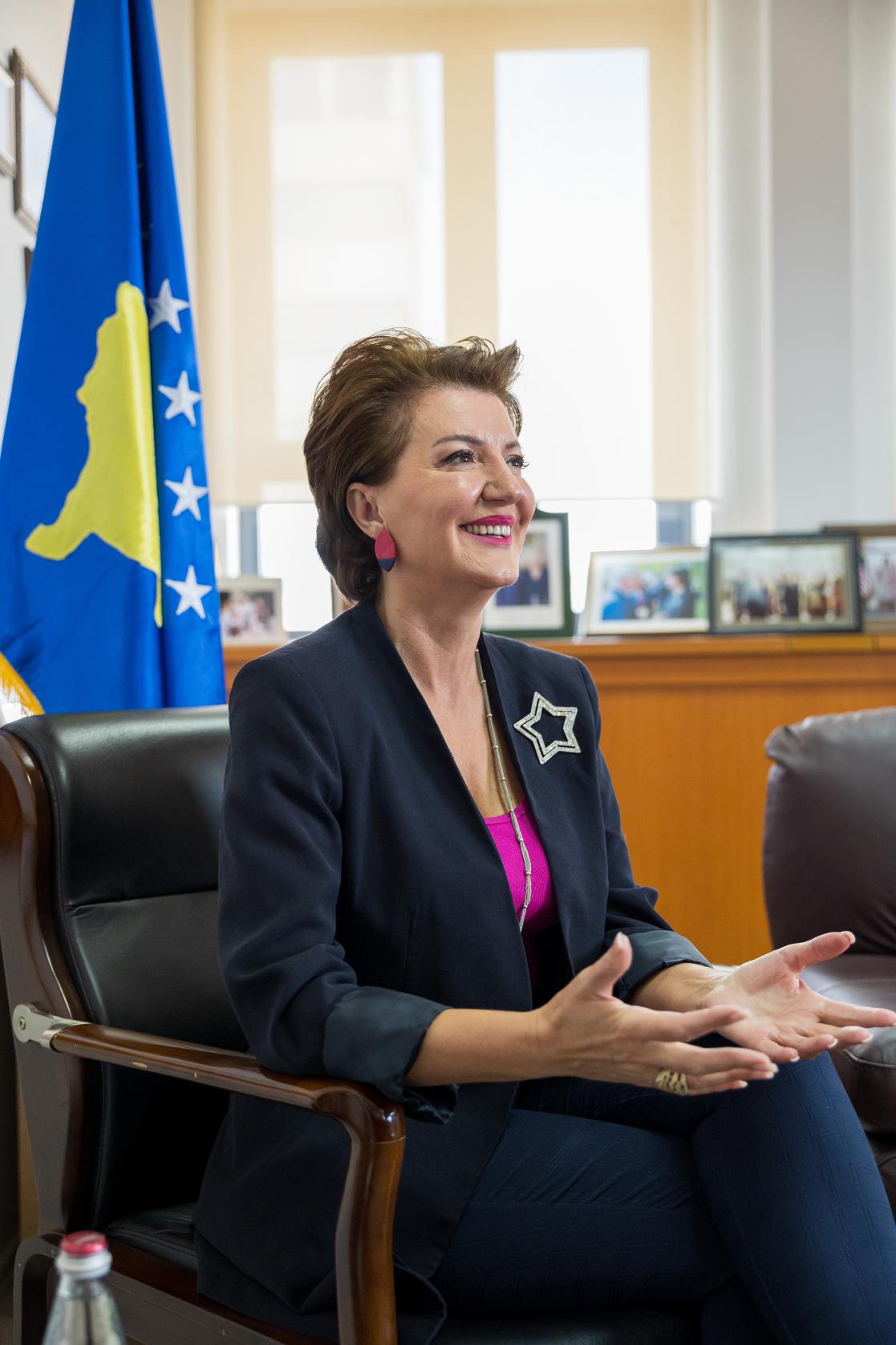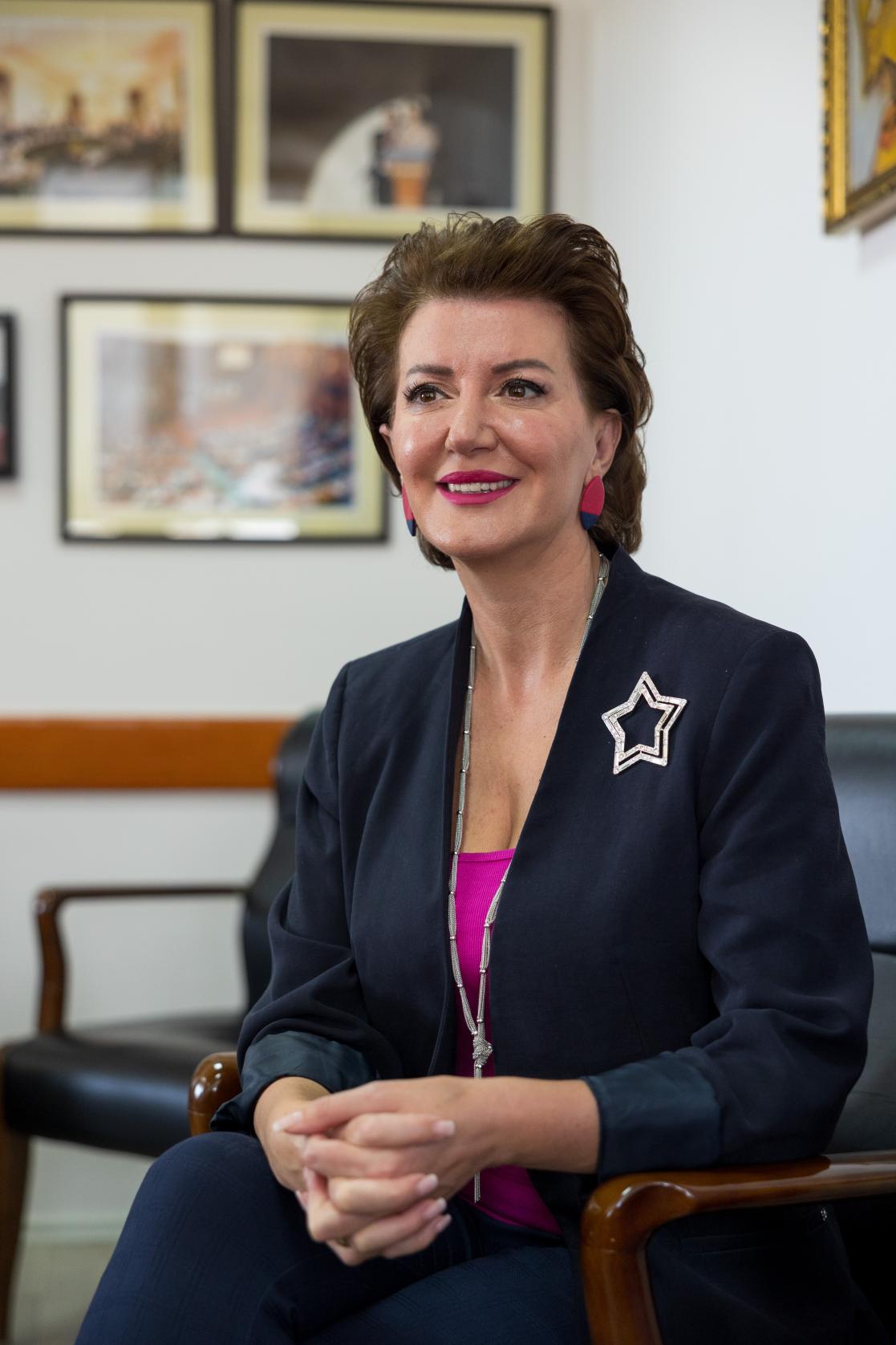Interview with the former President of Kosovo Atifete Jahjaga on Women, Peace and Security Agenda

- Ten years have passed since, in 2012, you hosted the International Women’s Summit "Partnership for Change. Empowering Women" and the adoption of the Pristina Principles. How do you see the situation of women in Kosovo evolving since then?
The International Women’s Summit “Partnership for Change. Empowering Women” took place in Pristina, the capital city of the first nation in Southeast Europe to elect a woman as Head of State, and it offered a great opportunity for Kosovo to gather women leaders from different sectors and from all around the world to discuss and seek for ways in enhancing the principles set in the UN Resolution 1325, by promoting the role of women in decision-making, economy, security, as well as bringing forth the long overdue gender equality that is crucial for every society to develop.
The adoption of the Pristina Principles was an important milestone, as it set in motion a series of changes that have helped improve the participation of women in public life, not only in Kosovo. It makes me immensely proud to know that this small nation – one that is often harshly and unfairly judged, has paved the way and served as a good example for other women in the region and beyond.
Ever since the adoption of the Pristina Principles, more women have joined the public scene of Kosovo; we have since elected another woman as Head of State, we have had a woman, Speaker of the Assembly, a woman President of the Constitutional Court, two out of three Deputy Prime Ministers of the country are currently women, we have had a woman Mayor, a Major General at the Kosovo Security Force, and last but not least, we have exceeded the quota for women representation at the Assembly of Kosovo. Women have been more involved in party politics as well, holding high-ranking positions within most of the political parties in Kosovo, varying from Deputy Chairs to Organizational Secretaries.
On the economic side, more women have become entrepreneurs. More businesses are run or managed by women today than ever before in the history of Kosovo. And this is of particular importance because the path to equality goes through financial independence first.
On the educational front, statistics show that more women than men are completing higher education, and this indicates the bright future of this country.
Most importantly, we have been able to push forward the legal recognition of the survivors of conflict-related sexual violence during the war in Kosovo, setting up a Government Commission and instilling a process which is regarded as a good case by other countries worldwide in the way survivors are treated and redress is offered. Yet much more needs to be done in regard to access to justice.
In addition, there is still a lot to be done, especially in the rural areas, where women continue to not enjoy full freedoms, in comparison to those living in urban areas. This is why we should not be satisfied with what has been achieved thus far when we still have segments of our society that cannot enjoy equal opportunities, and where women are treated as something less than men.
Domestic and sexual violence presents another challenge – one that requires the immediate attention of the central government, the political scene in general, law enforcement institutions, civil society, and society as a whole. More should be done in offering protection for the abused, and stricter punishments should be imposed on abusers.
We have a lot to be proud of and a lot to celebrate, as we have come a long way; but until we tackle the issues of inequality and physical security for all women in Kosovo, we should remain restless in our fight.
- You have represented Kosovo around the world in discussions on the role of women in peace and democratisation processes. How do you think Kosovo has and can contribute to implementing the Women, Peace and Security Agenda?
I have had the honour of my life to represent Kosovo in different stages as its Head of State and to bring the example of Kosovo into these discussions. After the war, the need to construct everything from scratch, despite being painful and tiresome, has allowed Kosovo to build better institutions while learning from the best practices from all around the world. In this sense, Kosovo is rather unique. Hence, the international presence has helped us move ahead of our neighbours in several vital areas. Besides, the legislation adopted in Kosovo has been modern and in compliance with the EU Acquis.
Therefore, this unique character of our state-building enables Kosovo to contribute through its example to other parts of the world; where reforms are needed and where the Women, Peace and Security Agenda still needs to be used as a platform to push forward inclusion policies representing each group in our society.
The fact that Kosovo is not a member of the United Nations, and its independence is not fully recognized around the world, sometimes presents a challenge in making our voices heard. However, despite such challenges, Kosovo will continue to pave the way for other countries by leading by example. Actions speak louder than voices, and we must continue doing our best to fully implement the Agenda and become an example for the rest of the world to follow.

- From the war in Ukraine, disturbing allegations of the use of sexual violence against women as a weapon of war are being reported. Your tireless engagement in seeking justice for the survivors of sexual violence during the war in Kosovo resulted in the establishment of a specialised Commission, which is still implementing its mandate today. Can this Commission be an example for Ukraine and other countries?
Unfortunately, the use of sexual violence as a weapon of war remains a practice that continues to affect societies around the world. Only recently we heard of horrible accounts of sexual abuse against even children in the war in Ukraine. It is an unacceptable and inhumane practice, which is why I have dedicated a large portion of my public engagement and presidency to bringing justice for the women and men who endured this horrible experience, as well as preventing women, men and unfortunately children in other parts of the world from undergoing such horrendous experiences.
We have established the specialized Commission taking the best experiences from around the world, comprised of professional experts. This Commission was created with the help and experience of our allies, and the unfortunate circumstances Ukraine is in, make it necessary for them to establish such a Commission as soon as possible. I do believe that in this regard, Kosovo has very valuable input to give and solid know-how to share. Besides the formation of the Commission, there are several CSOs in Kosovo that deals with victims of sexual violence as a weapon of war, which could help the Ukrainian institutions and civil society in dealing with this rather delicate and highly painful part of the war.
The effects of wartime sexual violence continue way longer than the exact date the war ends. Survivors have yet to face the trauma and live with it every day. Some of the perpetrators will get caught and punished, whereas some may never be found or sentenced. Kosovo has suffered tremendously in this regard, and our country and its people would never wish to witness such a traumatic experience in other people from any country.
- When talking about Women, Peace and Security, we cannot avoid thinking about women in uniform. Before becoming President, you served as a General Lt. Colonel and Deputy General Director of the Police. What motivated you to join the police? Was it difficult for you as a woman in a male-dominated institution? How would you convince young women today that working in the police or security forces is a good choice for a woman in Kosovo?
I joined the Kosovo Police Service at a very difficult time, right after the war, and when this force was being established. The people of Kosovo have had a rather horrible experience with the police, especially in the 90s, when regular violations of human rights have been committed by people in uniform – the very people whose duty is to protect those rights. Not only was this a male-dominated industry, but it was feared and despised.
However, when the KPS was being formed, we were determined to change this negative perception that people had of this police force. And one way to do that was to have women in uniform. I was among the first women to join the KPS, and quickly rose in the ranks, holding several important positions within the KPS initially, and after the declaration of independence, the renamed Kosovo Police. Of course, it wasn’t always easy, as there was a lot of stigma and prejudice that women faced. However, there was solidarity among the women themselves, a lot of support from the male-dominated leadership of the Police as well as a lot of support from international organizations that worked closely with both the KPS and KP. When I left the KP, I held the rank of General Lt. Colonel and as you said, was Deputy General Director of KP.
The participation of women in the police and security forces is one crucial element in the fight for gender equality. This allows for more trust from the public in the law enforcement institutions themselves at the same time, women bring an important perspective to all issues including those related to domestic and gender-based violence. That is why at least one of the points of the Pristina Principles was the need for active participation of women in security issues, law enforcement and conflict resolution. Hence, I encourage women to join the police and the security forces at every opportunity I am given, as I am deeply convinced that society as a whole will benefit from their service.
- Participation and representation of women at the high political level is not the only aim of the Women, Peace and Security plan, but it is still an important objective. 20 years after the UNSC Resolution 1325, why do you think there are still so few women in decision-making positions, such as heads of government or lead peace negotiators?
We all witness everyday change ensuring greater participation of women in public life nevertheless often time we regard this change as not fast enough. The political decision-making, be it at a national or an international level, when it comes to women's participation, can steer things up, however, they need time. Thus we need to continue our efforts and break all the remaining glass ceilings, social construction and structural challenges hampering women’s and girls’ equal participation and place at the table. That is why it is crucial to work with young children and to teach them from the moment they enter their educational institutions, that they are all equal regardless of their gender.
Expectations from women are higher than the expectations from men. And this puts a very heavy burden on all these women leaders.
That is why I believe that it is important that we support one another, across borders, in lifting some of this heavy burden on women that men simply don’t have to carry. At the same time, we should encourage women to be less risk-averse. Even when a woman fulfils all of the criteria for a job position, statistically, she is disincentivized to apply as a result of lower confidence. The opposite takes place in men, in whom higher self-confidence encourages them to apply for jobs and undertake risks.
Nonetheless, there are more women leaders across the world now than ever before. We have more women Heads of State, Heads of government, parliamentarians etc. And this is a sign of the change that is happening across societies, and it gives me great hope that the future will be bright.

- Today you continue to have women empowerment at the centre of your work. Would you tell us about the Jahjaga Foundation? How important is economic independence for women? Concerning the security program goal of the Foundation, how do you work on laying out the conditions for those in a vulnerable position to be integrated?
Jahjaga Foundation is an organization that I founded right after I finished my mandate as the President of my country. The intention was that the organization would focus on continuing the work I had already done in advancing the position of women and marginalized groups of society during my mandate as the President of the country.
The vision of the Jahjaga Foundation is the consolidation of a democratic and inclusive country with equal opportunities for every citizen of Kosovo, in harmony with the countries of the region, as a prerequisite for security and social welfare.
The mission of the Jahjaga Foundation is to contribute to the democratization process in Kosovo through social inclusion, support for marginalized groups and the creation of conditions for peace in the region, serving as a mechanism for a) strategic support for these issues, b) mobilizing and empowering marginalized groups, and c) facilitating and coordination of relations between civil society organizations and the latter with state and regional institutions.
The Foundation works with and for women, young people, and marginalized communities around Kosovo. Together with the foundation, we have managed to implement projects that have empowered these groups on an educational, economic, and social level. Economic empowerment is the most crucial component since we see it as the main element that leads to liberation. Several projects at the Foundation have been dedicated to the financial empowerment of women, among which are: One in Three - an initiative for economic empowerment through a brand of clothing produced by marginalized women. The brand also aims to raise awareness about gender-based violence by including the global statistic that one in three women experience violence in the name of the brand. The Jahjaga Foundation has opened the One in Three workshops where 6 women, including ethnic minorities and survivors of violence work, and has so far launched three collections. Elava – has supported eight minority women in Klina, Kosovo in opening a professional cleaning business start-up and we continue to support them in strengthening and growing their initiative. They have had a series of training on different topics including business development, professional cleaning methods, marketing, and financial management. As of March 2022, when the business opened, the volume of work and requests for their services has increased.
- Finally, the Women, Peace and Security Forum organised at the initiative of President Osmani will take place between the 21 and 23 of October, what impressions of Kosovo would you like the participants to take with them when they leave?
I want all participants who come to Kosovo to see that despite the difficult past, we managed to build a modern and vibrant society, and those continuous efforts are made to ensure that women and girls take their place at the table. I hope that see that Kosovo is a source of progress for the region and beyond, a place that has paved the way for the whole of Southeastern Europe in giving opportunities to women.
We have still a long way to go in reaching our full potential as a society – and we believe that this can be achieved only through gender inclusion and gender equality
Simultaneously, I would like the participants to take with them a sense of feminist solidarity among one, especially among women. Unification for a common goal makes us all stronger and less vulnerable. Consequently, I would like to witness the friendships and the networks created at this Forum grow and get fostered over years. I am convinced that having another Forum of this level will strengthen our devotion to fighting social injustice and inequalities.
